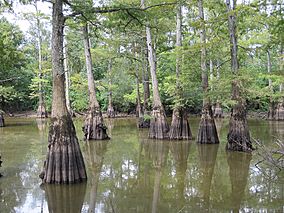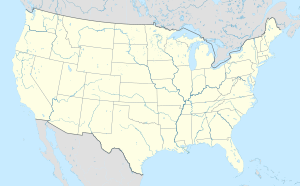Hatchie National Wildlife Refuge facts for kids
Quick facts for kids Hatchie National Wildlife Refuge |
|
|---|---|
|
IUCN Category IV (Habitat/Species Management Area)
|
|

Hatchie National Wildlife Refuge, Haywood County, TN
|
|
| Location | Haywood and Hardeman counties Tennessee, United States |
| Nearest city | Brownsville, Tennessee |
| Area | 11,556 acres (46.77 km2) |
| Established | 1964 |
| Governing body | U.S. Fish and Wildlife Service |
| Website | Hatchie National Wildlife Refuge |
The Hatchie National Wildlife Refuge is a special natural area in West Tennessee. It covers 11,556 acres (about 4,677 hectares) of wet, swampy land. This refuge is part of the floodplain of the Hatchie River. You can find it in southern Haywood County and central Hardeman County.
This area is a rich home for many kinds of aquatic life and waterfowl (birds that live near water). The refuge is crossed by major roads like Interstate 40 and U.S. Route 70. This means many people pass by it when traveling between Nashville and Memphis.
Contents
About the Hatchie Wildlife Refuge
The Hatchie National Wildlife Refuge was created in 1964. Its main goal is to protect the unique environment of the Hatchie River floodplain. This area is very important for many plants and animals. It helps keep their habitats safe and healthy.
What is a Floodplain?
A floodplain is a flat area of land next to a river. When the river overflows, this land gets covered with water. This flooding brings rich soil and nutrients to the area. It creates a perfect environment for certain plants and animals. The Hatchie River is one of the last free-flowing rivers in the lower Mississippi River valley. This means it can flood naturally, which is good for the refuge.
Why are Wildlife Refuges Important?
National Wildlife Refuges are special places set aside by the United States Fish and Wildlife Service. Their purpose is to protect wildlife and their habitats. They help make sure that animals have safe places to live, feed, and raise their young. These refuges also help protect important natural resources like clean water and healthy forests.
Animals and Plants You Might See
The Hatchie National Wildlife Refuge is home to a wide variety of wildlife. The mix of water, forests, and wetlands makes it a great place for many species.
Birds of the Refuge
Many different birds live in or visit the refuge. Waterfowl like ducks, geese, and wading birds are common. You might see great blue herons standing still in the water, looking for fish. Many migratory birds also use the refuge as a resting and feeding stop during their long journeys.
Fish, Snakes, and Mammals
The waters of the Hatchie River and its swamps are full of fish. These fish provide food for many other animals. Various types of snakes also live in the refuge, playing an important role in the ecosystem. Mammals like deer, raccoons, and beavers can also be found here. The refuge's diverse habitats support all these different creatures.
Unique Plant Life
The wet environment of the floodplain supports special kinds of plants. You can find large cypress trees and tupelo trees growing in the water. These trees are adapted to wet conditions. They provide shelter and food for many animals. The plant life helps keep the water clean and the air fresh.
Exploring the Refuge
While the refuge is mainly for wildlife, some areas are open for people to visit. It's a great place to learn about nature and see animals in their natural homes.
Activities at Hatchie
Visitors can enjoy activities like wildlife observation and photography. There are often trails for walking or hiking. These trails allow you to explore different parts of the refuge. It's a chance to connect with nature and see the beauty of the Tennessee landscape. Remember to always follow refuge rules to keep the animals safe and undisturbed.
Conservation Efforts
The United States Fish and Wildlife Service manages the Hatchie National Wildlife Refuge. They work hard to protect and restore the natural habitats. This includes managing water levels, controlling invasive species, and planting native trees. These efforts help ensure the refuge remains a healthy home for wildlife for many years to come.
 | DeHart Hubbard |
 | Wilma Rudolph |
 | Jesse Owens |
 | Jackie Joyner-Kersee |
 | Major Taylor |


